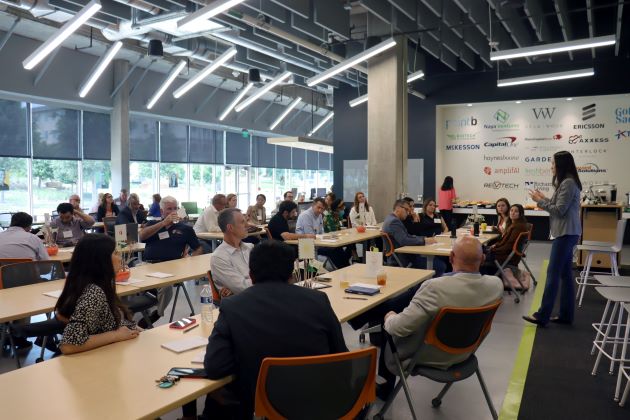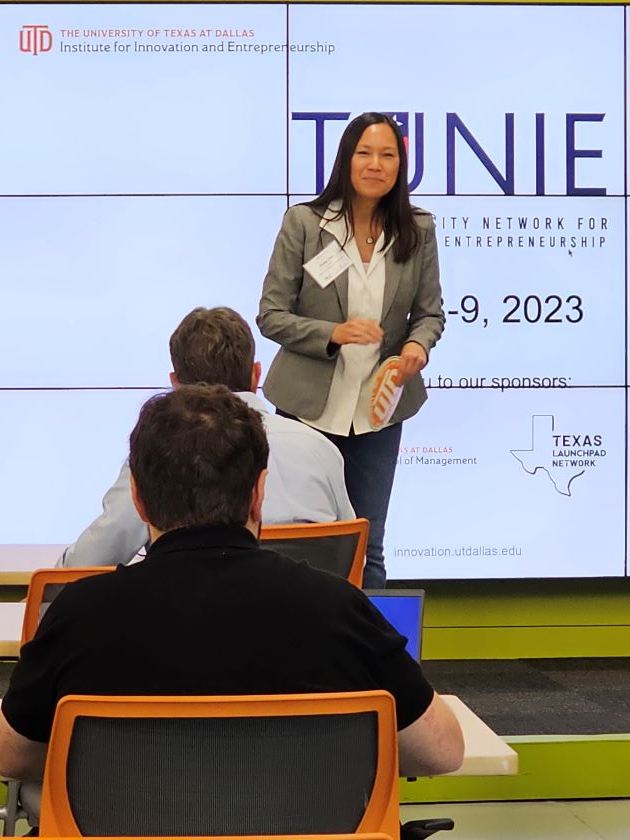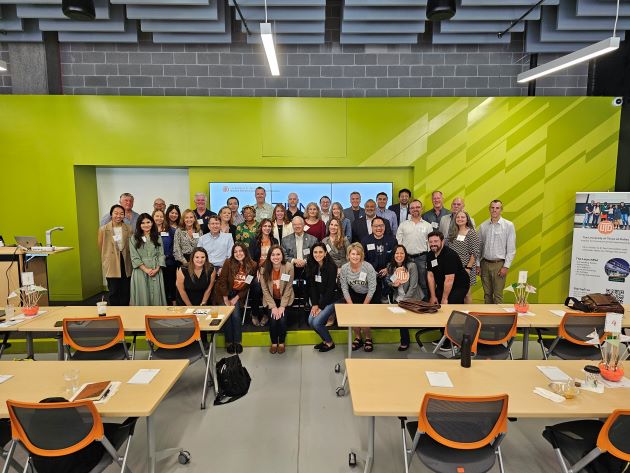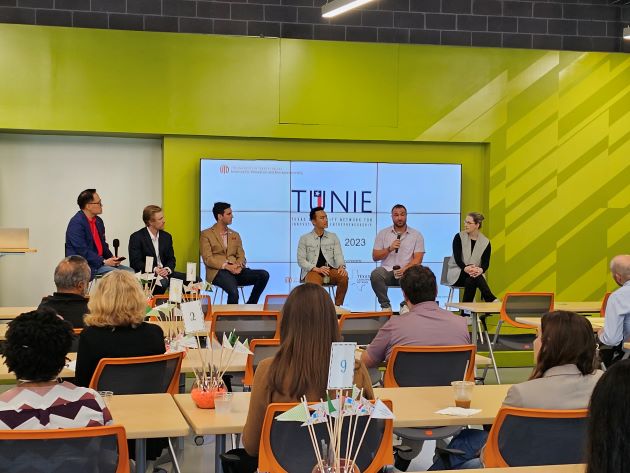
The Institute for Innovation and Entrepreneurship at The University of Texas at Dallas hosted the Texas University Network for Innovation and Entrepreneurship (TUNIE) Conference June 9-10 at the Blackstone LaunchPad. TUNIE furthers entrepreneurship and innovation for universities and colleges in Texas, allowing for an exchange of ideas and helping to bolster entrepreneurship initiatives.
It was almost 15 years to the day the first ever TUNIE Conference was held, UT Dallas the location for that one as well.
Aprille Busch, Executive Director of TUNIE, opened the conference by sharing that in the 2023 Princeton Review five of the top 25 undergraduate entrepreneurship programs are Texas universities, including UT Dallas. Five of the top 25 graduate programs also call Texas home, including UT Dallas.
“So clearly there’s a wealth of knowledge and expertise in this room that we can all share and utilize and really continue to make our programs the best that they can be,” she said.

Dr. Emily Choi, academic director of the innovation and entrepreneurship programs at the Naveen Jindal School of Management, led the first day with a challenge of coming up with a fictitious entrepreneurship center, both as a way to share ideas for better entrepreneurship-related offerings overall but also because this type of center is a very real goal for many schools. Participants brainstormed in areas from how to attract sponsorship to even how artificial intelligence — a hot topic in higher education and beyond — could be employed.
During a break in the conference, Choi shared what it means to be a part of putting on such an event.
“There are so many different kinds of centers and institutes in entrepreneurship and we wanted to give them the right environment to share and grow,” she said. “We are all trying to accomplish the main goal of bringing the entrepreneurship mindset and not necessarily saying a student has to become an entrepreneur but having an openness to innovation. We want to light a path where they really understand the inner workings beyond startups and just thinking about business in a different light.”
S.J. Murdock, IIE program manager, was excited for the results from the center challenge.
“Dr. Choi had the idea of putting our money where our mouth is and use the tools we teach students,” she said. “A business model and the value proposition are critical factors we wanted participants to focus on.”

Matthew Smilor, director of the Arnold Center for Entrepreneurship at Stephen F. Austin State University, found the exercise valuable, along with appreciating the overall breadth of the conference.
“UT Dallas did a terrific job with this event,” Smilor said. “The space has been perfect and I learned a lot from the exercise from the first day. You heard people with very different problems and the solutions just kept flying. People shared ideas about systems they use and what may be realistic and maybe tougher to accomplish. It’s a conference where you see how many people truly want to help each other.”
On day one of the conference, people envisioned how to start centers. On day two, a panel of former students from UT Dallas, Southern Methodist University and Rice University and a current UT Dallas student gave their own stories of being exposed to entrepreneurship knowledge as students and their thoughts on how centers could improve. Dr. Simon Mak, the Linda A. and Kenneth R. Morris Endowed Director of the Caruth Institute for Entrepreneurship at Southern Methodist University, moderated the panel.
The student was Tamara Marshall, who is pursuing an MBA/MSIE double degree, and is CEO of fish feeding technology company Manta Systems. Marshall won three different financial prizes last month at the Big Idea Competition at UT Dallas. After the panel, which included stories that ran the gamut from attempting to launch medical innovation to running a shaved ice truck, she spoke about what she hoped to get across.
“I … want more applicability to entrepreneurship that gets past theory and goes to execution,” she said.
Marshall’s and the other participants’ comments centered on the idea of the importance of getting direction from others on what can be a journey with many layers.
“The student panel was awesome!” said Kathy Carr, associate director of the John F. Baugh Center for Entrepreneurship and Free Enterprise at Baylor University’s Hankamer School of Business. “As a center administrator it was really great to hear from student alumni. I took more notes during this session than any other.”

During the panel, Marshall mentioned that a fellow panelist, Brian Hoang, BS ’19, founder of SURVIVR, a virtual reality police training system, was a mentor who kept her going when she had doubts on whether she could pursue her entrepreneurial vision. Hoang said he had his own support as well, saying that without UT Dallas, “I don’t know if I would’ve started my company and, if I had, I’m not convinced that it would have made it.”
After the panel, Hoang said he was elated to have had a positive effect on Marshall and to have another chance to represent the school.
“I’ve always been very bullish on the Institute for Innovation and Entrepreneurship and I felt like it was going into a next phase of ramping up when I was here,” said Hoang, who was able to share his own tribulations of his company surviving the pandemic during the panel. “I had a chance to connect with knowledgeable people like Bryan Chambers and get important advice.”
Dr. Joseph Picken, founder of the Jindal School’s innovation and entrepreneurship programs and the executive director for the first TUNIE conference, gave a few words to the audience, explaining how the conference began and later shared for this story how proud he feels in its continuation to help Texas students.
“This state has long been a place where businesses can thrive,” he said. “Students have the willingness, but they just need help in understanding how to get it off the ground and understanding how they could see it through. We all need a little direction sometimes.






